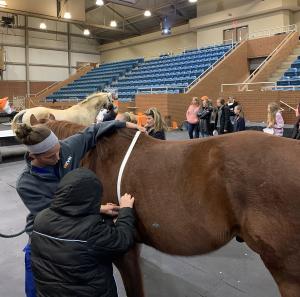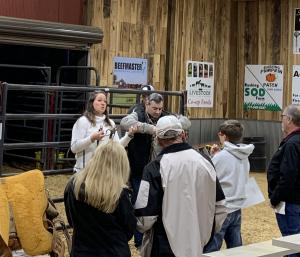From Sawyer Main
The University of Tennessee Institute of Agriculture held three in-person field days focused on horse management, with presentations and hands-on educational materials of interest to equine owners of all experience levels. Presentations were provided by faculty from UT’s Department of Animal Science, UT Extension and the UT College of Veterinary Medicine. The topics focused on estimating body weight, forage analysis and evaluation, and how to properly fit tack and equipment. Each event included dinner and was open to the public, all ages welcomed. The three events drew a total of around 215 participants.
The dates and locations of the field days were:
Dr. Jennie Ivey - Associate Professor and Equine Extension Specialist
Dr. Lew Strickland - Associate Professor and Extension Veterinarian
Dr. Gary Bates - Professor and Extension Forage Specialist
Ashley Self - Veterinary Nurse and MS Student
Larry Mitchell - Extension Agent
Kyra Petty - Extension Agent
Brian White - Extension Agent
Kaylee Layton - Extension Agent
Kevin Thompson - Research Center Director - Middle Tennessee Research and Education Center
Each Horse Management seminar was comprised of four breakout sessions, with dinner and research updates in between. Session 1 was on Forage Analysis by Dr. Gary Bates, followed by Session 2 on Tack Fitting. Session 3 covered Dental Care with Dr. Lew Strickland and Session 4 was on Body Weight Estimation.
Find more information about these field days at https://utianews.tennessee.edu/three-horse-management-field-days-scheduled-for-february/. Visit https://uthorse.tennessee.edu/ for a blog article on Pasture Management.
Editor’s Note:
Read a UT Extension document on Horse Welfare that includes feed, body condition scoring system, shelter, and horse care at: https://extension.tennessee.edu/publications/documents/pb1741.pdf. The body condition scoring system is particularly important, as some horses photographed at a recent horse show were BCS3-4, thin with ribs and hip bones showing.
The University of Tennessee Institute of Agriculture held three in-person field days focused on horse management, with presentations and hands-on educational materials of interest to equine owners of all experience levels. Presentations were provided by faculty from UT’s Department of Animal Science, UT Extension and the UT College of Veterinary Medicine. The topics focused on estimating body weight, forage analysis and evaluation, and how to properly fit tack and equipment. Each event included dinner and was open to the public, all ages welcomed. The three events drew a total of around 215 participants.
The dates and locations of the field days were:
- Tuesday, February 8 – Brehm Animal Science Arena at UT Institute of Agriculture Campus, Knoxville, TN
- Monday, February 14 – First Farmer’s Cooperative, 16219 Highway 22 North, Lexington, TN
- Tuesday, February 15 – Middle Tennessee AgResearch and Education Center, 1000 Main Entrance Drive, Spring Hill, TN
Dr. Jennie Ivey - Associate Professor and Equine Extension Specialist
Dr. Lew Strickland - Associate Professor and Extension Veterinarian
Dr. Gary Bates - Professor and Extension Forage Specialist
Ashley Self - Veterinary Nurse and MS Student
Larry Mitchell - Extension Agent
Kyra Petty - Extension Agent
Brian White - Extension Agent
Kaylee Layton - Extension Agent
Kevin Thompson - Research Center Director - Middle Tennessee Research and Education Center
Each Horse Management seminar was comprised of four breakout sessions, with dinner and research updates in between. Session 1 was on Forage Analysis by Dr. Gary Bates, followed by Session 2 on Tack Fitting. Session 3 covered Dental Care with Dr. Lew Strickland and Session 4 was on Body Weight Estimation.
Find more information about these field days at https://utianews.tennessee.edu/three-horse-management-field-days-scheduled-for-february/. Visit https://uthorse.tennessee.edu/ for a blog article on Pasture Management.
Editor’s Note:
Read a UT Extension document on Horse Welfare that includes feed, body condition scoring system, shelter, and horse care at: https://extension.tennessee.edu/publications/documents/pb1741.pdf. The body condition scoring system is particularly important, as some horses photographed at a recent horse show were BCS3-4, thin with ribs and hip bones showing.









